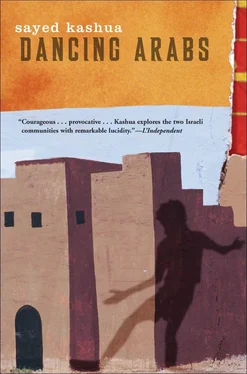I look at her in her sleep. Pretty. Facing the wall, as always. It’s still early, and she spent all of yesterday cleaning, while I connected the appliances and opened the extra bed I’d bought long ago.
“Get up,” I say. “We’re going home to get married.”
“What, now?”
So I took two days off from work and went home to be married.
My father had no objection to the wedding, quite the contrary. He liked the idea. He didn’t mind that I was only twenty-two. He said Samia is from a good family. Communists. Friends of his.
My mother is happy: a girl with a diploma. Maybe she’ll reform me too. Maybe she’ll gradually succeed in persuading me to go back to the university. “How many courses do you have left? Isn’t it a shame for those three years to go down the drain? Aren’t you ashamed of yourself, to have a wife who’s better educated than you are? I have to hand it to her for agreeing.”
My grandmother knows the refugees. Used to work with them picking fruit. “They’re the best women in the village,” she says. “Bring her here so I can see her.” Even though she can hardly see anymore.
Father says nobody in Tira gets married this way. “It can’t be done in two days. Even if we agree, her parents won’t. They have their self-respect, don’t they?” He says we won’t succeed in finding a hall overnight or inviting people. And I explain that I want it to be small. As far as I’m concerned, the only person we need at the wedding is the sheikh. But my parents wouldn’t dream of having anyone badmouth them or give anyone a pretext for saying they’re not as good as everyone else. “Isn’t it bad enough that the poor girl is marrying someone with no home of his own? Are you sure her parents agree?”
Samia’s parents agree because they have no choice. The rumors have finished them off already. Her mother had gone to pay a condolence call and overheard people discussing her promiscuous daughter who was studying in Jerusalem. In the mosque where her father prays every Friday, they mentioned her in the sermon. Not by name, but they spoke of parents who send their daughters off to university, where they turn into prostitutes.
My parents won’t give up. They settle on one hundred guests on each side, and Father closes a deal with a restaurant owner. They buy gold the way people used to in Tira, and give us money to buy clothes in Tel Aviv. Samia buys a dress on Shenkin Street, and I get a suit at Zara in Dizengoff Center. Nobody in either one of the families understands why we’re getting married like this. The sheikh arrives and I sign his papers seven times. Her father signs for her, which is the custom. We’re married now, and all I want is for everyone to finish eating so we can go home.
The next day, my mother called and said the teachers where she worked, the ones who hadn’t been invited, thought it was a shotgun wedding and we were just trying to avoid disgrace. Samia said her family hadn’t been sure if it was an engagement or a wedding, because at an engagement you only serve knaffeh but the restaurant had served a full meal. On the other hand, at a wedding you wear a bridal gown, but she’d worn a dress from Shenkin Street. Samia cried and said it was all my fault. She knew it wouldn’t work, I couldn’t think of anyone but myself, I wasn’t prepared to do anything for her, and her parents were hurt and angry because she hadn’t been married like everyone else.
My father chewed me out too. He said I was a mess. “Next week come again, and we’ll put an end to this disgrace.”
So we got married all over again. The checks covered the hall, the music, the photographer, a thousand guests, and a Netanya hotel. Apart from my aunts and their children, I hardly even knew anyone at my own wedding. I hadn’t invited anyone. Everyone had been invited by my parents or Samia’s. I put on my black suit and my black shoes, like in an Arab movie. I had to put the ring on Samia’s finger. I had to dance with her, even though I haven’t a clue about dancing the debka. I was supposed to cut the cake and kiss men whose names I didn’t know. I had to hug my aunts and uncles and smile at the camera. I had to listen to horrible music that never fails to give me a headache. And I had to put up with all that without any alcohol or cigarettes. Because I’m well-behaved and shy.
A few months after we got married for the second time, we moved into Beit Safafa. It used to be a village, but by then it was a neighborhood of Jerusalem. It’s good to be a stranger. Nobody follows you around. Nobody takes an interest in you, and the only thing the landlord cares about is that you pay the rent on time. True, our landlords are Arabs, but we still don’t feel like we belong. We have no relatives or acquaintances or friends here the way we do in Tira.
Our house is in an area that was occupied in 1967. Its Hebrew name is Givat Ha-Matos (Hill of the Plane), because an Israeli plane was downed there in the war. From 1948 to 1967 there’d been a barbed wire fence running through the village, splitting it in two. For nineteen years, brothers, relatives, and families living on either side of the fence couldn’t visit each other. Our landlady says that the only time the Israelis and the Jordanians would allow families to approach the fence and shake hands with two fingers was on holidays or wedding days. She showed us pictures of a wedding being celebrated on both sides of the fence. Half the family lived in Jordan and the other half in Israel, she said, and laughed. Now both halves are occupied by Israel, except that people in the part occupied in ’67 have residents’ passes and those in the part occupied in ’48 have citizens’ passes, so they’re considered superior and more loyal. At least their homes are higher. It figures — they’ve always had more work on the Israeli side.
My wife and I are citizens, and thanks to that our landlady treats us with respect, because we have medical insurance and social security and we know Hebrew well. The homes in the half of the village that was occupied in ’67 are cheaper, because there’s no sewage system, and the water and electricity are supplied by Arab companies, so there are a lot more power stoppages and problems with the water system. When war broke out — the Intifada — the Palestinian part came under much greater pressure because the electricity was cut every time Israel shelled Bethlehem or Beit Jala or Beit Sahur. There was a big settlement separating us from places that were shelled, but we still belonged with the Palestinians, at least when it came to water and electricity. Life became much more difficult with the Intifada, and my wife and I began to regret that we hadn’t rented in the Israeli half. The rent’s a little higher, but we would have managed with a smaller home.
Since the war broke out, there have been more soldiers milling around in the Palestinian half, and the power cuts are making the winters tougher, especially for the baby. We can hear the shellings, but they haven’t reached us so far. The Palestinian side of Beit Safafa is quiet, because they know that if they join the Intifada the Arab tenants will move out of the rented apartments, which are their main source of livelihood.
Almost all of the people in the Palestinian half have set aside a room for rental or built an extra home for citizens like us who are trying to leave their own village in favor of the big city. People feel solidarity with the ones who are being shelled just a short distance away, and they take up collections of toys and money for the refugee camps, but they won’t throw so much as a single stone at the Jewish soldiers who are underfoot everywhere. It’s embarrassing what people will do to make ends meet.
Читать дальше












